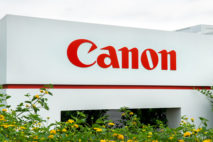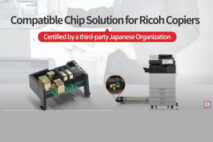At the end of January, Canon filed 11 patent-infringement lawsuits against 18 companies that manufacture or sell third-party toner cartridges for various Canon and HP-branded laser printers in the U.S. District Court for the Southern District of New York (see “Here We Go Again: Canon Sues Firms for Infringing Various Gear and Drum Patents”). What the OEM did not do at the end of January or in the month and a half since is bring a complaint before the U.S. International Trade Commission (ITC) asking that the ITC commence a so-called 337 investigation into infringement of its intellectual property and requesting that the commission issue an exclusion order as remedy.
This has been a topic of some debate at Actionable Intelligence. At the beginning of February, Actionable Intelligence President Charles Brewer was convinced it was only a matter of time before Canon sought an ITC investigation. I wasn’t so sure. This isn’t because my crystal ball is newer or shinier or better in any way than Mr. Brewer’s, but simply because this isn’t what I have seen Canon or other OEMs do in the past.
When Canon brought its patent-infringement complaint against Ninestar and various affiliates and distributors in 2010, it did so simultaneously before the ITC and in federal district court (see “Part 2: Canon Takes Aim at Ninestar, Should Others Worry?”). The firm did the same with its 2012 litigation (see “Reman Nightmare Realized: Canon Sues Dozens Over Infringing Gear”), which ultimately netted it a general exclusion order (GEO) from the ITC. Other OEMs have done much the same, filing suit before the ITC and in federal district court simultaneously. Typically, the action in the district court case is stayed pending the results of the ITC investigation, which is why we had Epson and Ninestar arguing in the U.S. District Court for the District of Oregon years after the ITC awarded the OEM its historic GEO back in 2007.
It just seemed weird to me that if Canon had plans to ask for a Section 337 investigation, it wouldn’t do so at the same time as bringing its patent-infringement complaints in district court. And it made me wonder: Why isn’t Canon initiating an ITC investigation this time around?
Some differences between the OEM’s 2012 litigation and its 2014 litigation are that Canon is alleging that far more patents are infringed this time around, and these patents are used in a smaller number of cartridges and thus a smaller base of machines. So perhaps Canon felt it wasn’t worth going to the effort of initiating an ITC complaint to protect a handful of cartridges used in 50 machines.
But this argument doesn’t hold water. While Canon is looking to protect a smaller number of products in this suit, the patents themselves are more numerous and much newer and cover a dongle gear design (see “A Look at the Dongle Gears Central to Canon’s Latest Patent-Infringement Suits”) in which Canon appears to have invested significant R&D, indicating that Canon probably plans to use this gear design in more products moving forward. Moreover, the 50 laser printers and MFPs Canon is looking to protect in the lawsuit are some of HP’s and Canon’s latest models—models it will be selling far into the future and for which presumably it would like to protect its supplies revenue. These differences between the suits make it seem more likely, not less, that Canon would initiate an ITC investigation and seek a GEO. But the firm has not done so.
Thus, a more plausible explanation may be that Canon is not all that satisfied with the GEO it was awarded in June 2013. I am sure champagne corks popped in Tokyo and Melville, NY, when the ITC’s remedy was revealed, but it may be that champagne wishes for a changed industry post-GEO turned into a lingering headache as numerous aftermarket firms quickly announced non-infringing gear designs that had been cleared by U.S. Customs and Border Protection.
At one time, many believed that if Canon won a GEO, it would cripple the third-party supplies industry’s ability to offer aftermarket cartridges for many HP and Canon laser devices in the United States, much the same way Epson’s GEO essentially killed the Epson compatible business in the United States. But that hasn’t happened. While Canon’s GEO may have resulted in fewer infringing SKUs, today aftermarket manufacturers continue to offer customers a steady supply of compatible and remanufactured cartridges for Canon and HP devices.
Could it be that Canon found the individual settlements and consent judgments and permanent injunctions it gleaned from various defendants as a result of its 2010 and 2012 litigation more valuable than the ITC’s GEO?
All this is speculation, of course, and Canon could ask for a Section 337 investigation tomorrow, proving my crystal ball cracked and Mr. Brewer right after all. (And Mr. Brewer is right more often than he’s wrong.) But Canon’s latest round of lawsuits has me wondering: Hey Canon, how happy are you with that GEO? And if you are happy with the ITC’s remedy, why no similar request for an ITC investigation and GEO this time around?







1 Comment
Another possible reason that Canon did not file an ITC Complaint yet is that they’re waiting for responses from the many companies we heard received Cease & Desist letters in early January relating to alleged infringement of the dongle gears in which the C & D letter recipients were given 90 days to comply.